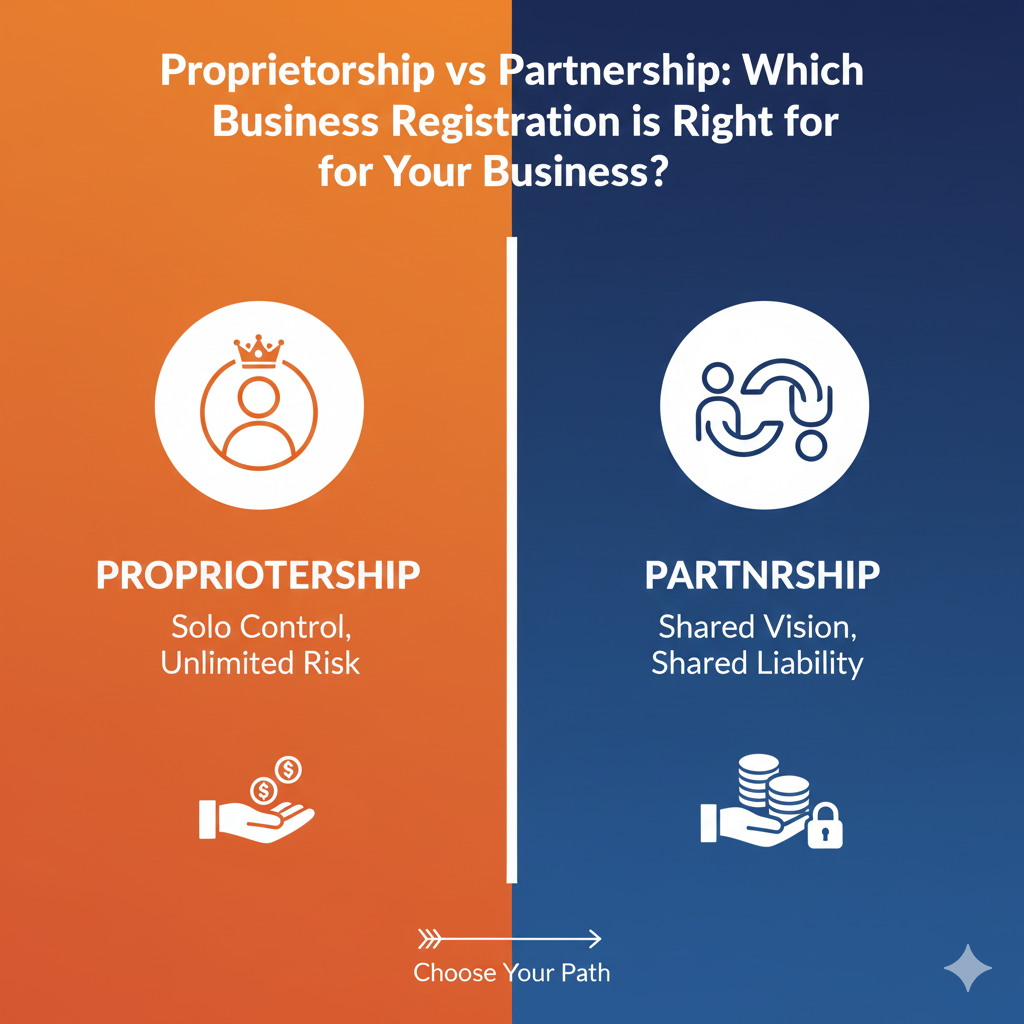Introduction: Your First Big Business Decision
Starting a business is exciting, but one of the first crucial decisions you’ll face is choosing the right legal structure. In India, two common choices for small and medium-sized enterprises (SMEs) are the Sole Proprietorship and the Partnership Firm.
Often, entrepreneurs struggle to differentiate between them and understand which one best suits their vision, risk appetite, and growth plans.
This guide will break down the core differences, advantages, and disadvantages of Proprietorship vs. Partnership Firms, helping you make an informed decision for your business’s foundation.
What is a Sole Proprietorship Firm?
A Sole Proprietorship is the simplest and easiest business structure to set up. It’s essentially an individual running a business, with no legal distinction between the owner and the business itself.
- Key Feature: “You are the business, and the business is you.”
- Who is it for? Best for individuals starting small, low-risk ventures, home-based businesses, or freelancers who want complete control.
A. Advantages of a Sole Proprietorship
- Ease of Formation: Almost no formal registration process required. You can start operating immediately after obtaining necessary operational licenses (like GST or shop establishment license).
- Complete Control: The proprietor has full decision-making power.
- Low Compliance: Minimal regulatory filings compared to other structures.
- Profit Retention: All profits belong solely to the proprietor.
B. Disadvantages of a Sole Proprietorship
- Unlimited Liability: This is the biggest drawback. The proprietor’s personal assets (home, car) are not separate from the business’s liabilities. Debts of the business are personal debts.
- Limited Capital: Raising funds is challenging, as it’s typically limited to the owner’s personal savings or small bank loans.
- No Separate Legal Entity: The business ceases to exist if the proprietor dies or becomes incapacitated.
- Limited Growth Potential: Difficult to expand significantly without bringing in external partners or capital.
What is a Partnership Firm?
A Partnership Firm is a business structure where two or more individuals (partners) agree to share the profits or losses of a business carried on by all or any of them acting for all. It’s governed by the Indian Partnership Act, 1932.
- Key Feature: “Two heads (or more) are better than one.”
- Who is it for? Ideal for two or more individuals who want to pool resources, skills, and capital, and share responsibilities and risks.
A. Advantages of a Partnership Firm
- Easier Formation than Company: Relatively easy to set up, though it requires a Partnership Deed.
- Pooled Capital & Resources: Partners can bring in more capital, expertise, and connections.
- Shared Responsibilities: Workload and decision-making can be distributed among partners.
- Better Credibility (than Proprietorship): Banks and suppliers often view partnerships as slightly more credible due to shared responsibility.
B. Disadvantages of a Partnership Firm
- Unlimited Liability: Like proprietorships, partners have unlimited personal liability for the firm’s debts. A crucial point is “joint and several liability”—meaning any single partner can be held responsible for the firm’s entire debt.
- Lack of Separate Legal Entity: The firm is not separate from its partners.
- Potential for Disputes: Disagreements among partners can significantly disrupt the business.
- Limited Life: The firm can dissolve upon the death, retirement, or insolvency of a partner (unless the deed specifies otherwise).
- Difficult to Transfer Ownership: Ownership transfer usually requires the consent of all partners.
Proprietorship vs. Partnership Firm: A Side-by-Side Comparison
| Feature | Sole Proprietorship | Partnership Firm |
| Number of Owners | 1 | Minimum 2, Maximum 50 (for non-banking) |
| Legal Status | No separate legal entity | No separate legal entity (Partners are the firm) |
| Liability | Unlimited (Personal assets at risk) | Unlimited (Joint & Several Liability for all partners) |
| Formation | Easiest, minimal formalities (no specific registration) | Easy, requires Partnership Deed (registration optional but recommended) |
| Capital Raising | Limited to owner’s personal funds | Easier, as multiple partners contribute |
| Control & Management | Complete control by one owner | Shared control, based on Deed |
| Continuity | Ends with the owner | Can end with partner changes (unless specified) |
| Taxation | Owner pays individual income tax | Firm files separate ITR, partners pay tax on share of profit |
| Trust/Credibility | Lower | Moderate (due to more owners) |
Which Registration is Right for Your Business?
Your decision should weigh your business goals against your comfort with risk and capital needs.
- Choose Sole Proprietorship If:
- You are starting alone with minimal capital.
- Your business involves low risk.
- You want complete control and minimal compliance.
- You are a freelancer or a very small service provider.
- Choose a Partnership Firm If:
- You have 2 or more co-founders with complementary skills and shared vision.
- You need to pool more capital and resources.
- You are comfortable with shared decision-making and shared (unlimited) liability.
- Your business requires a slightly larger initial setup.
Crucial Tip: For a Partnership, a well-drafted Partnership Deed is paramount. It should clearly define roles, responsibilities, profit-sharing ratios, capital contribution, dispute resolution mechanisms, and partner withdrawal terms.
Conclusion: Laying a Strong Foundation
Both Sole Proprietorship and Partnership Firms offer simpler routes to starting a business compared to Private Limited Companies or LLPs. However, their defining feature—unlimited liability—is a significant consideration.
Carefully evaluate your specific circumstances. While simplicity is appealing, understanding the long-term implications for growth, liability, and dispute resolution will ensure you choose the structure that truly supports your entrepreneurial journey.







